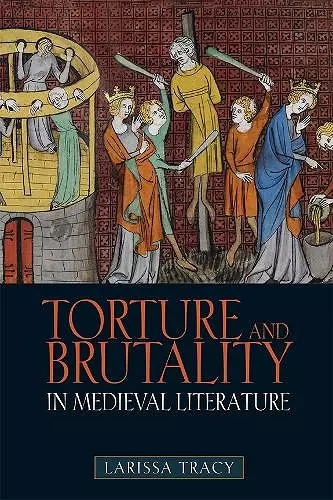Torture and Brutality in Medieval Literature
Negotiations of National Identity
Format:Paperback
Publisher:Boydell & Brewer Ltd
Published:15th Jan '15
Currently unavailable, and unfortunately no date known when it will be back

A new look at the way in which medieval European literature depicts torture and brutality. An ugly subject, but one that needs to be treated thoroughly and comprehensively, with a discreet wit and no excessive relish. These needs are richly satisfied in Larissa Tracy's bold and important book. DEREK PEARSALL, ProfessorEmeritus, Harvard University. Torture - that most notorious aspect of medieval culture and society - has evolved into a dominant mythology, suggesting that the Middle Ages was a period during which sadistic torment wasinflicted on citizens with impunity and without provocation: popular museums displaying such gruesome implements as the rack, the strappado, the gridiron, the wheel, and the Iron Maiden can be found in many modern European cities.These lurid images of medieval torture have re-emerged within recent discussions on American foreign policy and the introduction of torture legislation as a weapon in the "War on Terror", and raised questions about its history and reality, particularly given its proliferation in some literary genres and its relative absence in others. This book challenges preconceived ideas about the prevalence of torture and judicial brutality in medieval society byarguing that their portrayal in literature is not mimetic. Instead, it argues that the depictions of torture and brutality represent satire, critique and dissent; they have didactic and political functions in opposing the statusquo. Torture and brutality are intertextual literary motifs that negotiate cultural anxieties of national identity; by situating these practices outside their own boundaries in the realm of the barbarian "Other", medieval and early-modern authors define themselves and their nations in opposition to them. Works examined range from Chaucer to the Scandinavian sagas to Shakespeare, enabling a true comparative approach to be taken. Larissa Tracy isAssociate Professor, Longwood University.
Tracy's insights regarding writers' (often specious) rejections of torture as belonging to an alienated past, a pagan oppressor or a foreign enemy, serve as a timely rejoinder to the ways in which we do exactly the same, in labelling as 'medieval' the brutality that characterizes societies and governments now just as it did then. * REVIEW OF ENGLISH STUDIES *
[T]he ambitious scope of this project is impressive and laudable. [...] a truly impressive [book] in the range of its historical and geographic coverage. * THE MEDIEVAL REVIEW *
The value of this book rests not only in its redefinition of medieval attitudes to torture, but also in its consideration of modern attitudes to torture. [.] Its wealth of detail and breadth of coverage ensure that it has the potential to become one of the seminal studies in the field. * ÓENACH: FMRSI REVIEWS *
Tracey convincingly points to a persistent 'literary resistance' to unjust uses of pain for power. [...] Highly recommended. * CHOICE *
Larissa Tracey's book constitutes an illuminating challenge to popular conceptions of the Middle Ages. [...] her study suggests that [...] modern times have more in common with the Middle Ages than most of us might like to believe. * TLS *
Tracy's in-depth study historicizes torture, demonstrating that, as a rare topos of medieval literature, it predominantly articulated a distrust and rejection of violent judicial practices. Whatever its impact on modern-day detractors of medieval civilization may be, this argument should become part of medievalists' further reflection on the place and meaning of cruelty in the Middle Ages. * SPECULUM *
ISBN: 9781843843931
Dimensions: unknown
Weight: 516g
336 pages